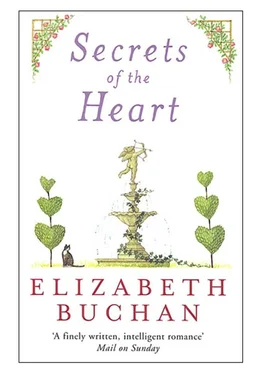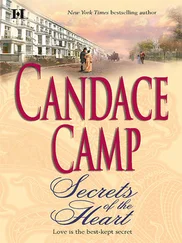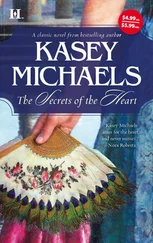Elizabeth Buchan - Secrets of the Heart
Здесь есть возможность читать онлайн «Elizabeth Buchan - Secrets of the Heart» весь текст электронной книги совершенно бесплатно (целиком полную версию без сокращений). В некоторых случаях можно слушать аудио, скачать через торрент в формате fb2 и присутствует краткое содержание. Жанр: Современные любовные романы, на английском языке. Описание произведения, (предисловие) а так же отзывы посетителей доступны на портале библиотеки ЛибКат.
- Название:Secrets of the Heart
- Автор:
- Жанр:
- Год:неизвестен
- ISBN:нет данных
- Рейтинг книги:5 / 5. Голосов: 1
-
Избранное:Добавить в избранное
- Отзывы:
-
Ваша оценка:
- 100
- 1
- 2
- 3
- 4
- 5
Secrets of the Heart: краткое содержание, описание и аннотация
Предлагаем к чтению аннотацию, описание, краткое содержание или предисловие (зависит от того, что написал сам автор книги «Secrets of the Heart»). Если вы не нашли необходимую информацию о книге — напишите в комментариях, мы постараемся отыскать её.
Secrets of the Heart — читать онлайн бесплатно полную книгу (весь текст) целиком
Ниже представлен текст книги, разбитый по страницам. Система сохранения места последней прочитанной страницы, позволяет с удобством читать онлайн бесплатно книгу «Secrets of the Heart», без необходимости каждый раз заново искать на чём Вы остановились. Поставьте закладку, и сможете в любой момент перейти на страницу, на которой закончили чтение.
Интервал:
Закладка:
After she had told Pierre it was over and that she was not coming back to Paris, Agnes had finally tumbled to the conclusion that the good and bad areas of a marriage were irrelevant. You grew round the other person, like fat and muscles over organs, and that was that.
Maud shrugged. ‘You needn’t look so disapproving, Agnes. I have a point, and John knew it. Anyway, he probably didn’t hear what I said.’
‘But he did .’ Bea was as fierce as it was possible to be.
No fool, Maud realized that her trespass was too far and she adjusted her tone to a more reasonable one. ‘You ought to sell this millstone, Agnes. It’s done nothing but bring trouble and misery on all of us. Think. We could all have some money to buy somewhere sensible.’
Agnes’s fingers folded across the cup and tightened but she said nothing. An empty bag is impossible to burst and it was best with Maud in this mood to be as empty as possible.
‘For a start, there’s a leak in the blue bedroom ceiling,’ said Maud, ‘and the roof is getting worse.’
‘I know, I know,’ said Agnes. Maud had a nose for the details. ‘It’s on the list.’
‘Long ago,’ Maud had once, in a rare soft moment, told the frightened little cuckoo who had dropped into her nest, ‘John and I had to mend the roof. Nail fatigue, I think. The men found a plate in the rafters, one of the Delfts. A maid must have broken it and been too frightened to own up. She would have lost her place.’
That a plate could so alter a life had shocked Agnes. She had asked to see the pieces, and Maud obliged. Agnes cradled them in her hands: indigo blue and greyish white shapes, which had ridden over a dark sea from Holland to the sun-flecked drawing room in England. If she thought hard enough, she could still feel the sharp, gritty edges that had grazed her skin.
‘But why ever not sell?’ Maud saw the nice, clean, warm bungalow slipping away.
Agnes finished her tea. As clearly as if he was in the room, she heard her uncle’s voice. ‘Family, tradition, history, not letting go…’ Those were the charges laid on her by him. To be fair to Maud, they probably did not make sense. But they made absolute sense to Agnes. ‘By the way,’ she said, ‘the Jane Austens are missing from his bedroom. Someone has moved them. Do you know where they are?’
‘You were wrong ,’ said Bea, for a second time. She whirled round, fierce and trembling.
Maud poured herself another cup of tea. ‘Thank God I’m not a proper Campion,’ she said. ‘It’s perfectly ridiculous.’
Both Agnes and Bea knew exactly what this outburst betokened. Maud had always felt excluded, an interloper of forty-five years who could never quite see her way into the charmed circle. The pretty bride who had married John had never truly found her niche.
‘Actually, can we not argue?’ Bea looked ill with distress.
Agnes reached for her bag and extracted her notebook. ‘Let’s sort a few things out, then we can have lunch.’
‘I’ll lay up.’ Bea struggled to her feet.
Maud watched her sister bustling around with china and silver. ‘Not those spoons for soup, Bea,’ she said, after a moment or two. ‘Will you never learn?’
A couple of hours later, Agnes tucked Bea into bed for a nap and ordered her to stay put for at least an hour. Maud retired to the small sitting room, formerly the butler’s pantry, in which the television and video-recorder were installed. Within minutes, music drifted through the house.
Tackling a pile of paperwork in her uncle’s study, Agnes heard the familiar notes and knew exactly what Maud was watching. First, the unsoiled grey-green vista of an Alpine mountainside on which a dot appeared to fling wide its arm and loose a string of high notes. Then, in a director’s sleight of hand, the camera panned down to transform the dot into Julie Andrews. Once again, Maud was worshipping at the shrine of The Sound of Music.
Agnes gritted her teeth and telephoned Bel, her co-director at Five Star, the production company they ran together. Bel operated from the London end and they kept in constant touch. Half-way through their discussion on the schedule for their project, The Death of the English Apple, she heard Maud cry out. Agnes shot down the passage to find her transfixed in front of the screen, which was now a mass of moving colour and song.
‘It’s so sad. I can’t bear it.’ Maud pressed a hand to her mouth.
Agnes sat down beside her. ‘Maud, John was eighty. I know he didn’t want to die but perhaps…’ She could not bring herself to continue.
Maud stiffened. ‘Oh, that ,’ she said. ‘I meant,’ she pointed to the screen, ‘she looks so young and beautiful, so pure, and I can’t bear it.’
Agnes looked. Julie Andrews was progressing up the aisle in her wedding dress, and the choir were singing like angels. She counted to five and leaned over to tuck the tartan rug around Maud’s angular form. ‘You know this is your home, don’t you? Always. You mustn’t worry.’
Maud dropped her hand and turned a countenance on Agnes on which incomprehension and anger were etched. (Agnes could almost predict the number of seconds required for Maud to slot into dramatic gear.) But Maud surprised her. She stretched out an arm to Agnes, the paste ring quivering on her finger like a roosting insect, and the aggression was replaced by a weary regret. She pulled at a fold of papery skin at her wrist. ‘Look at me. Old. Drained. Fatiguée. If you take on this house, you will end up the same.’
‘Hush, Maud.’ Agnes tried to soothe her, but Maud grabbed her.
‘ Believe me.’
1939-45 was the era of yet another war, and of Morse code.
Before sending a message from the field to Home Station, an agent was required to key a message into a numbered phase. From there, he or she would hook it up to a second transposition, at which point the original message had been thoroughly scrambled.
The concept of double transposition appealed to Julian Knox, who, being fascinated by codes, had picked up a history of the Special Operations Executive during the Second World War in a bookshop and bought it. He had reached the section on coding. The mathematical constructions were fascinating. So was the neatness of a code and, in contrast, its risky fireworks and the dig-deep analysis to which he responded. He liked, too, the exhilaration of stalking an objective enfolded in cryptographic darkness and of dragging it into the light. He liked the puzzle and, when the key was exposed, its absolute rationality.
He was thinking about safety and danger, the closed message and the clear, as he drove down the motorway from London to Lymouth, where he lived and where Kitty, his mistress, was waiting. On the way, he planned to detour to Charlborough, which was only eight or so miles to the west of Lymouth, Mrs Campion had invited him to drop in at any time, and Friday afternoon seemed as good as any and fitted in with the weekend schedule.
In the period since Maud Campion had called, faithful Angela had been busy. She had extracted relevant material from the County Masterfile, which, because they did so much work in the area, was kept permanently up-to-date. It included a report on the river systems, its farming (the ratio of arable to dairy), its parishes, topography, recorded footpaths and hedgerows. She had also produced a large-scale map of Charlborough on which she had highlighted with coloured marker pens the railway lines, churches, glebelands, school playing-fields and conservation areas. Julian insisted that the team was meticulously briefed and, because he played fair, that included him.
Still reflecting on the subversions, the almost erotic moment of discovery posed by the code, he drove through the moorland that separated the snug, thriving coastal town of Lymouth from Charlborough, which was struggling to preserve its shop and bus route.
Читать дальшеИнтервал:
Закладка:
Похожие книги на «Secrets of the Heart»
Представляем Вашему вниманию похожие книги на «Secrets of the Heart» списком для выбора. Мы отобрали схожую по названию и смыслу литературу в надежде предоставить читателям больше вариантов отыскать новые, интересные, ещё непрочитанные произведения.
Обсуждение, отзывы о книге «Secrets of the Heart» и просто собственные мнения читателей. Оставьте ваши комментарии, напишите, что Вы думаете о произведении, его смысле или главных героях. Укажите что конкретно понравилось, а что нет, и почему Вы так считаете.








